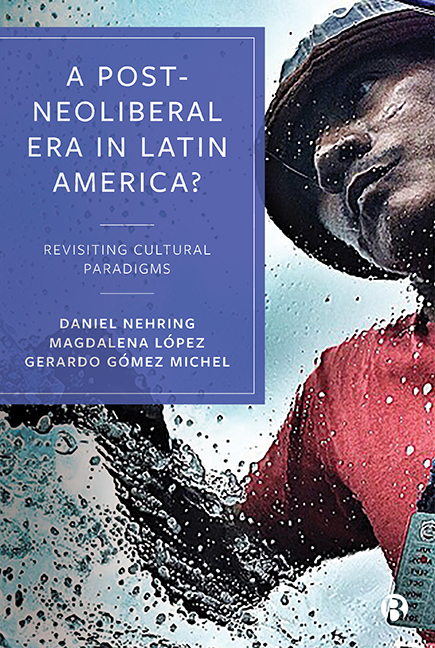Book contents
- Frontmatter
- Contents
- List of Tables and Figures
- Notes on Contributors
- 1 Introduction: Everyday Life in (Post-)Neoliberal Latin America
- 2 Imaginaries, Sociability and Cultural Patterns in the Post-Neoliberal Era: A Glance at the Argentinean, Paraguayan, and Venezuelan Experiences
- 3 Making Neoliberal Selves: Popular Psychology in Contemporary Mexico
- 4 From Uribe’s “Democratic Security” to Santo’s Peace Accords with the FARC: Hate, Fear, Hope and other Emotions in Contemporary Colombian Politics
- 5 Cine Bajo Tierra: Ecuador’s Booming Underground Cinema in the Aftermath of the Neoliberal Era
- 6 Neoliberalising Humanity: Culture and Popular Participation in the Case of the Street Market of Caruaru, Brazil
- 7 The Contribution of the Catholic Magazine Espacio Laical and the Constitution to the Cuban Public Sphere
- 8 Argentina: The Philosophical Resistance to the Conquest of the Soul1
- 9 Fleeing (Post-)Chávez Memories: The 1990s and the Black Friday Generation
- 10 Re-imagined Community: The Mapuche Nation in Neoliberal Chile
- 11 Neoliberalism and the Negotiation of the American Dream in Contemporary Latina Narratives
- 12 Bare Life in Contemporary Mexico: Everyday Violence and Folk Saints
- Index
4 - From Uribe’s “Democratic Security” to Santo’s Peace Accords with the FARC: Hate, Fear, Hope and other Emotions in Contemporary Colombian Politics
Published online by Cambridge University Press: 20 April 2022
- Frontmatter
- Contents
- List of Tables and Figures
- Notes on Contributors
- 1 Introduction: Everyday Life in (Post-)Neoliberal Latin America
- 2 Imaginaries, Sociability and Cultural Patterns in the Post-Neoliberal Era: A Glance at the Argentinean, Paraguayan, and Venezuelan Experiences
- 3 Making Neoliberal Selves: Popular Psychology in Contemporary Mexico
- 4 From Uribe’s “Democratic Security” to Santo’s Peace Accords with the FARC: Hate, Fear, Hope and other Emotions in Contemporary Colombian Politics
- 5 Cine Bajo Tierra: Ecuador’s Booming Underground Cinema in the Aftermath of the Neoliberal Era
- 6 Neoliberalising Humanity: Culture and Popular Participation in the Case of the Street Market of Caruaru, Brazil
- 7 The Contribution of the Catholic Magazine Espacio Laical and the Constitution to the Cuban Public Sphere
- 8 Argentina: The Philosophical Resistance to the Conquest of the Soul1
- 9 Fleeing (Post-)Chávez Memories: The 1990s and the Black Friday Generation
- 10 Re-imagined Community: The Mapuche Nation in Neoliberal Chile
- 11 Neoliberalism and the Negotiation of the American Dream in Contemporary Latina Narratives
- 12 Bare Life in Contemporary Mexico: Everyday Violence and Folk Saints
- Index
Summary
Introduction
This chapter first presents explanatory factors concerning Colombian divergence from the recent tendency in several Latin American countries toward 21st century models of political socialism or in conjunction with post-neoliberal development. It then explores the complex legacy of political culture bequeathed by the governments of Álvaro Uribe Vélez (2002–06 and 2006–10), which involved an important military effort to combat the Revolutionary Armed Forces of Colombia (FARC by its Spanish acronym) but was not able to defeat them, although their debilitation undoubtedly constituted one of the factors that led to the negotiations in Havana. Hatred and fear of the FARC, promoted by President Uribe's discourse supported by the mainstream media and important journalistic sectors, are then explored as factors in conjunction with societal ideological homogenization around the policy of “Democratic Security.” The chapter moves onto the redefinitions in the political culture and hegemonic communicative regime promoted by President Juan Manuel Santos (2010–14 and 2014–17), which favored promoting successful conclusion of the peace process with the FARC and initiation of a new, complex and still uncertain phase of national reconciliation among Colombians, notwithstanding obstinate Uribistic loathing of both the FARC, and President Santos and President Uribe's systematic and ideological delegitimization of the peace process. This section also deals with issues concerning the October 2, 2016 plebiscite regarding the ratification of the Havana Accords, the triumph of the rejectionists, the renegotiation of the Accords with representatives of the rejectionists by the government's negotiating team, the mobilization of the citizenry in defense of the Accords, and the ratification of the revised Accords by the Congress at the Teatro Colón. The chapter concludes by outlining some of the challenges and possible alternatives for the country's political development during the post-Accord era.
Colombian divergence and its causes
Colombia has not had a “pink tide” experience since the beginning of the 21st century unlike several other Latin American countries because it has not experienced anything like 21st century socialism or an eventual post-neoliberal alignment. Such divergence has a few explanations.
Colombian conservatism
During the 20th century Colombia was characterized by conservative politico-cultural hegemony.
- Type
- Chapter
- Information
- A Post-Neoliberal Era in Latin America?Revisiting Cultural Paradigms, pp. 71 - 92Publisher: Bristol University PressPrint publication year: 2019



